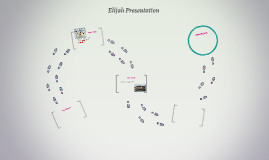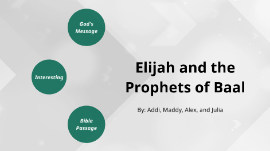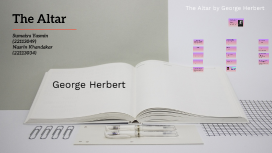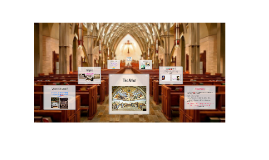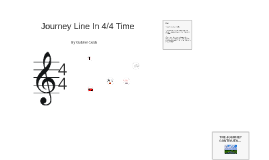THE ALTAR
Transcript: Iambic pentameter, for the first four lines, and stress on the second syllable. First line says your servants give you a broken altar So the altar is comprised of a human heart, and handmade, no tools were allowed to smooth out the altar and make it pretty/ without flaws. Hence no workman's stools That, if I chance to hold my peace, These stones to praise thee may not cease. Oh let thy blessed SACRIFICE be mine, And sanctify this ALTAR to be thine. Who's the intended audience? A broken altar, Lord, thy servant rears, Made of a heart, and cemented with tears: Whose parts are as thy hand did frame; No workman's tool hath touched the same. What is the occasion? Who is the Speaker? Take special notice of the first line, "Lord" is sandwiched in between both the altar and the servants. Giving oneself up as a sacrifice to God. Perhaps after sinning and hardship, the speaker feels as though their heart is broken, and wants God to cut through they "stone" and mend their "hard heart" with His love. The kind of poem can be called an "emblem poem" a "shape poem" or even an "hieroglyphic" poem because of the form it possesses and how it directly relates to the subject material Biblical Quotes This portion of the poem has two iambs Why does God revel in self-sacrifice? In the first stanza, it seems the speaker is quite emotionally distraught, as he speaks of creating a broken altar, and "rearing" it, almost as if he is speaking of growing a child. He continues by saying that the altar is made of a heart and cemented with "tears", the process seems painful, and the speaker unwilling (hence the tears) One of the descendants of Cain used fashioned an altar out of tools, quite unfaithfully I might add, (Cain was the one God hated). So God angered by the unfaithful altar said A A broken ALTAR, Lord, thy servant rears, A Made of a HEART, and cemented with tears: B Whose parts are as thy hand did frame; B No workman's tool hath touched the same. C A heart alone C Is such a stone, D As nothing, but D Thy power doth cut. E Wherefore each part E Of my hard heart F Meets in this frame, F To praise thy name: G That, if I chance to hold my peace, G These stones to praise thee may not cease. H Oh let thy blessed SACRIFICE be mine, H And sanctify this ALTAR to be thine. What's the central purpose of the poem Iambic pentameter 5 beats In the old testament one of the first mentions of an altar is the story of Abel and Cain ALTAR HEART SACRIFICE ALTAR Paraphrase III The form Quite often there is imagery of stones, and brokenness The brokenness represents, the imperfection of the human soul, In Christianity every human is born flawed, sinful and imperfect, the altar may reflect the sinning and broken heart, which is why the Lord wants a broken altar just as the human is imperfect so too is the altar, which is the reflection of a perpetually flawed human heart. Paraphrase I Shaped like an altar, Herbert took special care to even make sure the form was religious and was directly related to the text. The speaker is saying that the heart incredibly hard, and nothing but God can penetrate it. The speaker then goes on to say that he is assembling each part of his heart, so one assumes it's broken To prais his Supposedly those who have broken spirits, are more submissive and therefore better accepted into God's kingdom. Well the poem was published in 1633, and in that time in England Christianity was pretty popular, and the Bible was a mandatory study for all writers before the 20th century. The speakers intended audience seems suited for a very large amount of people, the entire population perhaps. Paraphrase II Tone Throughout the poem, a few words were repeatedly capitalized I will give you a new heart and put a new spirit in you; I will remove from you your heart of stone and give you a heart of flesh. And I will put my Spirit in you and move you to follow my decrees and be careful to keep my laws. (Ezekiel 36: 26,27) A heart alone Is such a stone, As nothing, but Thy power doth cut. Wherefore each part Of my hard heart Meets in this frame, To praise thy name: If I were to quiet, stop praying, or stop communicating, my altar would keep praising you Let me sacrifice myself for you And cleanse/make holy my heart/altar/stones In the second stanza the though, the tone becomes slightly uplifting as the speaker moves his focus of his emotions, and more towards praising the Lord. The broken pieces of the heart are now actually in the form of an altar. Some one perhaps who has a broken heart, someone who's been extremely damaged but is prepared to sacrifice oneself to god to become pure. Tone Pattern! Also after the fall, the heart supposedly turned into stone because of Adam's and Eve's betrayal, so it is only God's power than can cut through the stone and give one a heart of "flesh", this can only be attained through pure worship. Even if fearful, one should sacrfice oneself to the Lord. Why does think a broken soul makes one more appealing to God?






